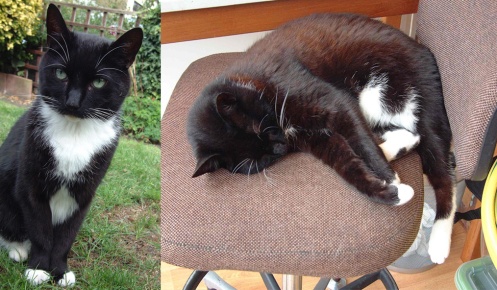Picking through bags and boxes, the remains of Mum’s belongings – her trinkets and trophies, her cut-glass and china, her photographs and postcards – we were pulling apart the threads of her life. For eighty years (a weaver as a young woman) she wove together a lifetime of memories in the silly and stupid things she gathered around her. And now we were dismantling it. The measure of her existence now just a small pile of junk, their meaning lost, fit only for a charity shop.
I kept a few things, ancient objects redolent of my childhood: an old wooden lamp in the shape of a ship, a box brownie, a little silver cup. I also kept a boxful of bowling trophies – horrible, tasteless plastic things, gold and silver, set on plinths of imitation marble. In themselves meaningless and of no real value. But together, as a collection, they remain a testament not only to Mum’s great passion for bowling but also to her grandiose bad taste. In my memory, and captured in several photographs, the old house of my childhood – her home for over fifty years – literally sparkled with trinkets and trophies such as this. She loved to fill the space around her with shiny objects.
And now I have them in my shed. I can’t throw them away. They occupy space in my life and I don’t know what to do with them.
We were three brothers at her bedside – finally brought together at the end.
The distance I travelled was measurable.
Holding her hand, talking to her, talking to my brothers . . . it was a family reunion, a last evening together at the end of Mum’s life.
Exhausted and in distress, her breathing was laboured. She wasn’t responding. Every breath she took required an enormous effort of will. Reserves of energy almost entirely dedicated to automatic processes of staying alive. But even so, I felt sure she heard and understood everything we said. Hearing is generally thought to be the last of the senses to shut down.
It was heartbreaking to see her struggling like that. Running low, unable to cope. Even the staff were upset by it. Mum was a popular resident. Everyone liked her.
A member of staff called in to see her before going off duty.
“Goodbye Emily” she said. Then she leaned over and kissed Mum on the forehead:
“Go when you want to . . . and have a safe journey”.
Later that night, after my brothers had gone, I held her hand and stroked her hair. Just the two of us. Then I left the room to find a nurse. When I returned a few minutes later Mum was no longer breathing.
“Mum? . . . Have you gone?”
I rang for staff and took her in my arms. A bit of blood came from her mouth, and I could tell she had just died. I think she chose her moment. For 48 hours she had never been alone, always someone with her. And yet she chose to go during those few brief moments when I was out of the room. Surely intentional, I’m told it happens that way quite often. I wanted to be with her when she died – to help her through it. I felt guilty for not being there, and wondered whether she might have felt abandoned – like I had somehow dropped the ball. But maybe it was a private thing. Maybe she felt the time was right. Maybe she wanted to spare us the grief of witnessing it. I don’t know.
But at the end of days, I guess you leave life just as you entered it – completely alone.
My elder brother is convinced Mum waited for me – hanging on to life until I arrived. It may be true. And of course I like to think it was true. Just as I like to think she heard everything we said . . . finally choosing her own moment to go.
Ultimately, though, I’m just glad I got there in time. Not just for her, but for me as well. I wanted to be with her – to tell her how much we loved her . . . and what a good job she did in bringing us all up. It may have been an ordinary death – like millions upon millions of ordinary deaths before her – but to me it was a very special moment. Nothing horrible. Nothing to be afraid of. And in fact I found it strangely comforting in many ways. The fear of death (for me) is generally less about death itself than it is about that moment of transition from one state to the other – from the state of being alive to the state of being dead. And watching Mum that night – how difficult it was for her – how laboured the simple act of breathing in and out – I think I saw for the first time how, under certain circumstances, it can actually be easier to die than to stay alive.
It reminded me of those times when, as a small boy, I had to go to the dentist to have a tooth extracted. In those days, under gas, I always seemed to have the same experience. As my head pounded, I always felt compelled to keep pace with the pounding inside my head by pedalling with great effort as though on a bicycle . . . pedalling for my life. And if I stopped pedalling . . . then I knew something really bad would happen. Maybe I would die.
So maybe, in a similar way, Mum simply got tired of pedalling . . . and it was just easier to let go . . .
Sometimes, as we watched over her that night, she would occasionally miss a few breaths . . . one . . . two . . . and then start up again. And thinking about it later, it was almost like watching someone ‘testing the water’ – putting a toe in the great ocean of the universe to see how it felt – practising the art of dying in order to catch that one chosen moment.
I called my brothers, and afterwards I stayed with her for quite a long time. It didn’t bother me. She was still my Mum.
I’ll grow smaller and smaller
Till I’m the smallest thing on earth.
On an early morning, in a summer meadow
I’ll stretch my hand to the smallest flower
And hide my face in it, whispering:
On you, little child, without shoes or clothes,
Heaven leans its hand
In a flashing drop of dew
So that its giant sky
Shan’t break in pieces.
Humility – Jiri Wolker
Blinky. He was living rough in our back gardens for at least a year. I saw him sometimes on hot summer days curled up fast asleep under the foliage next door. Then one day about three years ago he turned up looking dusty and undernourished – and I suddenly realised he must be homeless. In exchange for a small piece of fish, he came inside and looked around. He trusted me. I let him try out the new sofa – that’s to say, the other side of it, not the side he occupies now, my side, which we mostly end up sharing – and he never left.
At the end of that first week I found him upstairs – in my bedroom – under the duvet with his head on the pillow!
I know what his interests are: food, sleep and sniffing around his territory outside. Not much else. (I bought him a small cooked chicken for Christmas this year – all to himself. What better?).
I enjoy watching him make decisions – knowing his agenda is quite different to mine, and organised according to a world view I know nothing of. I’d like to understand it more – if indeed there’s anything more to understand. I know that many of his decisions appear to be based on temperature – too warm, too cold, not warm enough, not cool enough. I also enjoy watching him eat – seeing his absolute pleasure in the taste of wet food and the crunchiness of dry biscuits (especially when I provide something different).
I suppose nearly everything in his short little life is about pleasure. How to get it, and where to look for it. How to survive. And how to make the best of things.
I am the heart and soul of this place. I am the smallest part of the smallest grain of sand – the whisper of life at the edge of the tiniest speck of dust. Above me rises a universe of rock and stone. The centuries move in close harmony here, the sides of mountains slide slowly towards the plain, painstaking in their momentum. And yet I am, in my infinitessimal smallness, taller than any mountain; my shoulders are broader and carry more weight. I move my head and the earth slips sideways on its universal axis. I shut my eyes and the world shuts down.
Deep down right at the heart of things I am. God is in the details.
Since it has often been the task of art and literature to reveal the extraordinary within the ordinary, here’s an invitation to observe, discuss and credit some of those little (seemingly inconsequential) details of life from which big things of great consequence are made.



